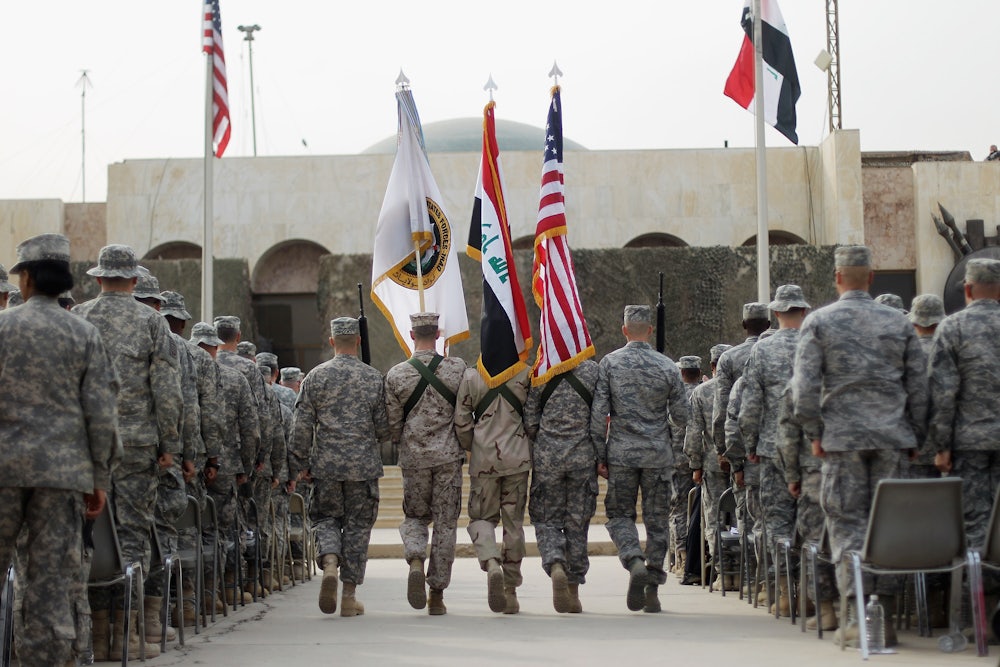In 2013, a decade after the Army’s 3rd Infantry Division entered Baghdad and toppled Saddam Hussein, the service undertook a major exercise in self-reflection. Commissioned by Gen. Ray Odierno, the Army chief, and finished under Gen. Mark Milley—now the chairman of the Joint Chiefs of Staff—the Army’s two-volume, 1,300-page assessment of the Iraq War, published in January, is a damning look at the Pentagon’s hubris that concludes with a single stunning declaration: “At the time of this project’s completion in 2018, an emboldened and expansionist Iran appears to be the only victor.”
We now know exactly how that victory was won, according to a newly published trove of Iranian intelligence cables: with the unwitting help of the United States.
The cables, obtained last week by The Intercept from the Iranian Ministry of Intelligence and Security, and published in conjunction with The New York Times, provide an almost dramatic retelling of how Iran took advantage of the institutional chaos that followed the 2004 U.S. invasion, filtering through nearly every aspect of Iraqi political and economic life. The Intercept reports that, as recently as last month, Maj. Gen. Qassim Suleimani—head of the Iranian Revolutionary Guard Corps’ Quds Force—arrived in Baghdad to help prop up Iraqi Prime Minister Adil Abdul-Mahdi, while hundreds of protesters laid siege to the government over his ouster.
“Having broken the country, the United States now needed to buy it. In reality, the U.S. shattered Iraq and ultimately walked away,” according to the Intercept. “It was Iran that ended up figuring out what to do with the pieces.”
The cables indicate that with every U.S. stumble, Iranian influence leaped forward. When the Coalition Provisional Authority disbanded the Iraqi military under its policy of de-Baathification, Iran exploited the resulting sectarian bloodletting between Sunnis and Shia to co-opt former Iraqi military officers to their own ends. As the U.S. started to rebuild institutions flattened under that policy, Iranian envoys cultivated alliances with key Iraqi officials such as Abdul-Mahdi and other future Cabinet members of former Prime Minister Haider Al Abadi. According to The Intercept, “one undated section of an intelligence ministry cable shows that Iran began the process of recruiting a spy inside the State Department.”
When the U.S. announced a camera-ready “withdrawal” in 2011, the human intelligence sources it immediately abandoned became willing associates of new Iranian paymasters. “The CIA had tossed many of its longtime secret agents out on the street, leaving them jobless and destitute in a country still shattered from the invasion—and fearful that they could be killed for their links with the United States, possibly by Iran,” the Intercept reports. “Short of money, many began to offer their services to Tehran. And they were happy to tell the Iranians everything they knew about CIA operations in Iraq.” One informant, referred to as “Source 134992” and nicknamed “Donnie Brasco” by the CIA, ended up “broke and terrified that his ties to the Americans would cost him his life,” turning to Tehran for protection: “He said that everything he knew about American intelligence gathering in Iraq was for sale: the locations of CIA safe houses; the names of hotels where CIA operatives met with agents; details of his weapons and surveillance training; the names of other Iraqis working as spies for the Americans.”
Like the Army’s own history of the Iraq War, the intelligence cable documents aren’t just a testament to Iranian guile: They’re a condemnation of U.S. nation-building in the twenty-first century. The invasion of Iraq, burdened with military hubris, threw out every existing source of stability and reignited centuries-old feuds that no two-week crash course in Farsi could fix.
Ironically, the new norm for nation-building that the U.S. established in Iraq has also become a blueprint for regional adversaries to increase their own geopolitical influence. In Afghanistan, where the U.S. continues a prolonged pullout amid increasing Taliban control over the country, both Russia and Iran have proven capable of bringing the militants to the table, expanding their influence and keeping the U.S. stretched thin. In Syria, the abrupt withdrawal of U.S. forces has created a similar vacuum for Russia and Turkey to flex their muscles, abandoning Washington’s Kurdish allies to the open arms of Syrian dictator Bashar Al Assad—placing them in a dilemma similar to that forced on the CIA’s former Iraqi assets. America’s modern attempts at nation-building are the geopolitical equivalent of breaking into a stranger’s house and then spending 20 years trying to clean up after yourself, while the stranger seeks help from her neighbors.
The most realistic view of modern American nation-building comes from War Games, the 1983 film that campily skewered the Cold War nuclear dogma of mutually assured destruction. Faced with the threat of an imminent nuclear missile launch, Matthew Broderick’s young hacker uses iterations of tic-tac-toe to convince a Pentagon supercomputer of the futility of trying to win an unwinnable game: “The only winning move,” the computer concludes, “is not to play.” Having ignored that advice in Iraq, the U.S. plays a game it cannot win: Nation-building is now just a matter of distributing losses—and casualties—over a long enough span of time to inure Americans to fruitless, empty conquests and deft competition from powers in the regions it invades.
